
– 25-08-2024 –
Twenty-First Sunday in Ordinary Time
Gospel reading: John 6:60-69
vs.60 After hearing his doctrine many of the followers of Jesus said,
“This is intolerable language. How could anyone accept it?”
vs.61 Jesus was aware that his followers were complaining about it and said,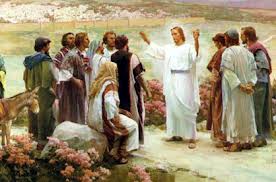
“Does this upset you?
vs.62 What if you should see the Son of Man ascend to where he was before?
vs.63 It is the spirit that gives life, the flesh has nothing to offer.
The words I have spoken to you are spirit and they are life.
vs.64 But there are some of you who do not believe.“
For Jesus knew from the outset those who did not believe, and who it was that would betray him.
vs.65 He went on, “This is why I told you that no one could come to me unless the Father allows him.“
vs.66 After this, many of his disciples left him and stopped going with him.
vs.67 Then Jesus said to the Twelve,
“What about you, do you want to go away too?”
vs.68 Simon Peter answered, “Lord, who shall we go to?
You have the message of eternal life,
vs.69 and we believe;
we know that you are the Holy One of God.”
*******************************************
We have four commentators available from whom you may wish to choose . Please scroll down to the ones you wish to consult.
Michel DeVerteuil : Holy Ghost Priest, late-director of the Centre of Biblical renewal in Trinidad.W.I.
Thomas O’Loughlin: Professor of Hist Theology Univ of Nottingham NG7 2RD
Sean Goan:Studied scripture in Rome, Jerusalem and Chicago
Donal Neary SJ: Editor of The Sacred Heart Messenger and National Director of The Apostlship of Prayer.
****************************************
Michel DeVerteuil
Lectio Divina with the Sunday Gospels
www.columba.ie
Textual Comments
This is the final extract from chapter 6 of John’s gospel that the Church invites us to meditate on at this time. We have had three rather abstract passages and, no doubt, you will be relieved to find that we have a story again, just as we had at the opening of the chapter.
The story has several characters. In your meditation, listen carefully to yourself and you will find that you are reading the passage from the perspective of one of them; stay with that perspective so that you enter the story personally.
There is, first of all, Jesus, and you might like to focus on him as he relates with the other characters. Watch his inner freedom. Already in the account of the feeding we saw him sitting on the hillside allowing the people to come to him out of their own freedom. So, too, here he gives each group their space, those who reject him as well as the twelve close chosen- including the betrayer.
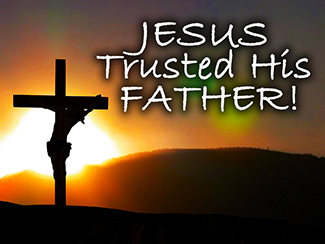 He also tells us the secret of his inner freedom: he knows he is in his Father’s hands and no one can come to him unless the Father allows it. This inner freedom gives him space to see others clearly, so that he is not deceived by people.
He also tells us the secret of his inner freedom: he knows he is in his Father’s hands and no one can come to him unless the Father allows it. This inner freedom gives him space to see others clearly, so that he is not deceived by people.
Let your memories of great people who have touched your life confirm the truth of St John’s account of Jesus, and of course, let him reveal to you how God wishes to relate with us.
Jesus’ words in verse 62 are difficult, but you might want to remain with them. “The Son of Man ascending to where he was before” probably refers to the painful journey through the passion which would test his followers to the utmost. Jesus, then, is the great leader who gives his followers a first test and judges whether they will survive the greater ones that lie ahead.
Every word of the great confession of Peter is important: the four statements are different aspects of the one deep commitment. What memories does this stir up in you? Make sure not to be self-righteous as you read of those who rejected Jesus. They symbolize us when we find some demand of God difficult to accept. The use of the word “language“ is significant. When our values go astray, we find the language of true believers alien to us.
The mention of the traitor might touch you. Judas is the symbol of the betrayal of Christian values that remains within every community and within each one of us.
Finally, there are the two sayings in verse 63 that are the kind of difficult sayings that occur several times in the chapter. As I have already urged you to do, be creative in your interpretation, asking yourself when you have experienced the truth of the sayings. “Flesh“ here is whatever in our lives or in our Church lacks the true spirit of Jesus and therefore is not life-giving in the deepest sense.
The second saying invites us to remember “words” that gave us life and to see how they could be considered “spirit“.
Prayer Reflection
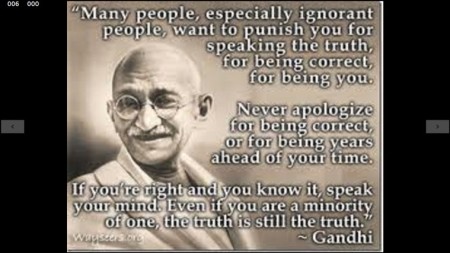
Lord, it sometimes happens that when we stand up for our values our companions stop going with us
• because we will not discriminate against people of a different race;
• because we refuse to give expressions of love that are not appropriate to a relationship;
• because we criticize those in authority.
Help us, Lord, when this happens, not to become bitter,
not to give up our values, but to understand, as Jesus did,
that we cannot force people to come to us
and that a relationship will only develop if you allow it to.
Lord, we thank you for all the times in recent years
when your Church has spoken out against injustice in different parts of the world, even when many of its members found this language intolerable and could not accept it.
Lord, we remember the time when we were upset because, for the first time, Jesus asked something hard of us.
Now, looking back on it, we smile. What if we had known then how much is entailed in following him on his way to you?
Lord, we live at the surface of ourselves, and so we lack energy and creativity.
Give us the grace to withdraw, from time to time,
to the depths of ourselves. Only if we go to the level of the spirit can we really live.
Lord, many preachers are content to repeat what they have heard from others. We thank you for those whose words have been life to us because they speak from the depths of their experience.
Lord, forgive your Church that we take pride in our great achievements
• the big numbers that attend our services
• our influence with the rich and the powerful
• our imposing buildings and prestigious institutions,
forgetting that the flesh has nothing to offer.
What will give life to the world is simplicity, truth, compassion, reverence for little people – all that we know to be the spirit of Jesus.
Lord, we thank you for the great moment when we knew we had made a life commitment
• we met the person we should spend the rest of our life with
• we gave our whole selves to a movement
• we read the life of a great person and were never the same afterwards.
We knew then that there was nowhere else for us to go; this was, for us, the way to eternal life.
We believed and we knew that this was the Holy One of God.
It was like that when people met Jesus.
Lord, to achieve anything worthwhile in life we have to take risks. We must go ahead and choose twelve, even though one of them may eventually betrays us.
Lord, there was a time when we made a deep act of faith and became complacent.
We thank you that you sent Jesus to us
• a friend pointed out how self-righteous we had become
• we fell back into a sin we thought we had finished with.
This was Jesus reminding us that the capacity to betray him is always part of us too.
Lord, send us leaders like Jesus who will proclaim their message,
even if many of their followers find the language intolerable and impossible to accept;
who will be free enough to turn even to their closest companions and say,
“What about you, do you want to go away too?”.
*************************************
Thomas O’Loughlin
Liturgical Resources for the Year of Matthew
www.columba.ie
Introduction to the Celebration
Rather than give an introduction, say something like this:
We are gathered here as sisters and brothers, members of the Body of Christ, so let us introduce ourselves to each other.
The Gospel
 When the community hears this passage, be that the community listening to John thousands of years ago or the community who hear it read at the liturgy today, it is the intention that they identify themselves with the confession of Peter. They, the listeners, are those who have decided that they should go to Jesus — and there is no one else to go to; and they are those who believe that Jesus is the one with the message of eternal life; and that Jesus is the Holy One of God.
When the community hears this passage, be that the community listening to John thousands of years ago or the community who hear it read at the liturgy today, it is the intention that they identify themselves with the confession of Peter. They, the listeners, are those who have decided that they should go to Jesus — and there is no one else to go to; and they are those who believe that Jesus is the one with the message of eternal life; and that Jesus is the Holy One of God.
This text appears to be a challenge to those who are hearing the message of Jesus (just as Joshua appears as a challenge to the Israelites) and appears to be a situation: now you must choose: Jesus or not! However, in fact it is not a challenge as the assumption of John is that if you are listening to this, then you have already chosen. So, in reality, it is a statement of identity.
This fact about the narrative structure of both this first reading and this gospel has important consequences for preaching. It is all too easy to imagine that the preacher must now hold a challenge to the congregation: are you for Jesus? This is neither useful nor appropriate.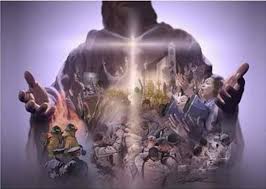 It is not appropriate in that the community is there in Christ as baptised brothers and sisters, not some loose assemblage of people vaguely interested in what Jesus has to say.
It is not appropriate in that the community is there in Christ as baptised brothers and sisters, not some loose assemblage of people vaguely interested in what Jesus has to say.
It is not useful in that it misses the point John wanted to make: know who you are, you are those who belong to the covenant, those who know that Jesus is the Bread of Life, the Holy One of God.
Lastly, the natural unit of text extends to v 71 but the last two verses have been omitted, correctly, because (1) this heightens the dramatic effect of Peter’s confession, and (2) the last verses do not make sense when this passage is read as a lection in Mark’s Year.
Homily notes
1. Avoid making challenges!
2. Ask this question: Who are we as a people, what unites us, what draws us here, what makes us live the lives we do?
3. We are the community who assert with Peter that there is no one else, but Jesus, who has the message of eternal life.
4. We are the community who assert with Peter that Jesus is the Holy One of God.
5. Now let us stand up and state that formally in our profession of faith.
**********************************
Sean Goan
Let the reader understand
www.columba.ie
Gospel
We come now to the last extract from John’s gospel and the end of the discourse on the Bread of Life. It highlights a theme that began in chapter 5 of John and that is a growing opposition to and refusal to believe in Jesus. While earlier in the discourse it was the crowds who were having difficulty with Jesus’ presentation of himself as the bread of life, now it is his own disciples who are complaining that it is too much to expect them to accept what Jesus has said about himself. 
Jesus replies that what he is speaking about can only be understood through the work of the spirit, i.e. through the eyes of faith. Some find the challenge too much and cease to follow him and in response Jesus asks the twelve do they also wish to go away. Peter replies with a confession of faith that demonstrates that he (and they!) are beginning to grasp something of the revelation that Jesus brings. Because they believe then they know that he is indeed the Holy One of God.
Reflection
‘What about you, do you also want to go away? No-one can be press-ganged into discipleship and Jesus yet again puts the choice before us as we gather for our Sunday Eucharist. Why is there a crisis here? Is it because they cannot believe that Jesus can truly give of himself in the way he has described? Is faith in the Eucharist too much to ask for? Perhaps it is not so much an intellectual difficulty about how this can happen but rather an intuition about the far reaching implications of what he is saying. For in giving us himself he is asking us to forget about ourselves and maybe that is just too much. Yet Peter speaks for us all when he says: ‘Lord to whom shall we go? Nothing in the world with all its possibilities and attractions can nourish our hunger to love and be loved as completely as Jesus, our Bread of Life.
Perhaps it is not so much an intellectual difficulty about how this can happen but rather an intuition about the far reaching implications of what he is saying. For in giving us himself he is asking us to forget about ourselves and maybe that is just too much. Yet Peter speaks for us all when he says: ‘Lord to whom shall we go? Nothing in the world with all its possibilities and attractions can nourish our hunger to love and be loved as completely as Jesus, our Bread of Life.
***************************************
Big Choices
We remember big and small choices in life. Ones that effected life totally like a job, marriage, retirement, redundancy; having an operation or many more. Or Choices about the children that effected their lives – school, moving house, health issues.
Life is made up of many choices, big and small. Human, spiritual and religious choices.
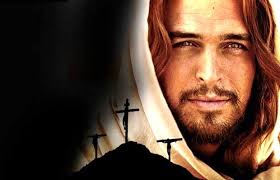 Peter had this sort of choice today. Would he go after Jesus or leave like others did. He stayed and he would have many more attempts at that choice. Why did he stay? Our choices come from something within us. We need Christ within us if we are to follow him.
Peter had this sort of choice today. Would he go after Jesus or leave like others did. He stayed and he would have many more attempts at that choice. Why did he stay? Our choices come from something within us. We need Christ within us if we are to follow him.
Peter had enough of love for Jesus inside him to make this choice, it might not always be easy and he would give in later but come back. His choice eventually would be to answer Jesus’ question – do you love me?
The choice for Jesus is the choice for love. In all sorts of ways. For those near at hand. If you choose Jesus then the hunger of the world as well as the tears of a baby affects you. What we do in love for others comes from the deepest part of life. We need to fill our lives with Christ to be able to share this love in big and small ways.
We need the company of other choosers. The community of faith and of the church. Peter says – to whom shall we go? We follow Christ together.

Let those words, ‘to whom shall I go, Lord’, echo in your prayer and talk to the Lord about how you feel.
Lord we pray for support and strength in our following of you.
*******************************************